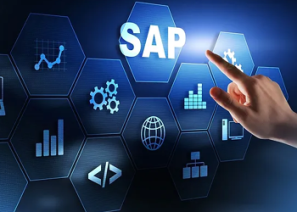SAP xECM Training || SAP xECM certification Training || SAP xECM Online training || SAP xECM self-paced training || SAP xECM Instructor-Led training
Key Features of Training:
- 25+ Hrs Instructor-led Training
- Mock Interview Session
- Project Work & Exercises
- Flexible Schedule
- 24 x 7 Lifetime Support & Access
- Certification and Job Assistance
SAP xECM(Extended Enterprise Content Management):
SAP Extended Enterprise Content Management (ECM) is a comprehensive software solution designed to streamline document and content management across an organization's extended enterprise, including suppliers, partners, and customers. It integrates with SAP systems to manage digital documents, records, and information, enhancing collaboration and compliance. SAP ECM helps businesses digitize and automate document processes, improving efficiency, data accessibility, and ensuring regulatory compliance. It also offers features like document archiving, workflow management, and mobile access, contributing to better information governance and overall business productivity.
Prerequisites: Who can attend SAP xECM Training?
- Basic IT Skills
- Familiarity with SAP
- Specific Roles
- Educational Background
- System Access
- Good Communication Skills.
Responsibilities of SAP xECM Consultant:
- Consulting and Solution Design
- System Configuration
- Integration
- Customization
- User Training
Course Benefits:
- Job opportunities
- Promotion opportunities (Salary Hike)
- Increased productivity
- Improved decision-making
- Gain in-demand skills
What is future of SAP xECM Consultant?
- Digital Transformation
- Cloud Adoption
- AI and Automation
- Hybrid ECM Environments
- Data Governance and Compliance
The fee for SAP xECM(Extended Enterprise Content Management) training can vary depending on several factors such as the location, duration of the course, training format, and level of expertise. SAP offers various training options for xECM, including instructor-led courses, e-learning courses, and virtual live classrooms.
For More details you can Register Sign Up
SAP xECM(Extended Enterprise Content Management) Certification FAQ's:
1. What is SAP ECM Certification?
SAP ECM certification validates an individual's knowledge and expertise in SAP's Extended Enterprise Content Management solution. It demonstrates their ability to work with SAP ECM effectively.
2. Why Should I Get SAP ECM Certified?
SAP certifications are recognized globally and can enhance your career prospects. They demonstrate your proficiency in SAP ECM, making you more valuable to potential employers.
3. What Types of SAP ECM Certifications Are Available?
SAP offers various certification levels and types, including associate, professional, and specialist certifications. The specific ECM certifications may vary over time, so check SAP's official website for the latest offerings.
4. How Do I Prepare for SAP ECM Certification?
You can prepare for SAP ECM certification by taking official training courses, studying the relevant materials, and gaining hands-on experience with SAP ECM. SAP's training resources and documentation are valuable for preparation.
5. Where Can I Take SAP ECM Certification Exams?
SAP certification exams are typically administered by SAP's authorized training centers and can also be taken online through the SAP Certification Hub.
6. Are There Prerequisites for SAP ECM Certification?
Prerequisites may vary depending on the specific certification level and type. Check SAP's official certification website for details on prerequisites for the certification you're interested in.
7. How Can I Register for SAP ECM Certification Exams?
You can register for SAP ECM certification exams through SAP's official certification website or by contacting an authorized training center.
8. What Is the Format of SAP ECM Certification Exams?
SAP certification exams typically consist of a combination of multiple-choice questions, multiple response questions, and hands-on exercises. The format may vary depending on the specific certification.
9. What Is the Pass Mark for SAP ECM Certification Exams?
The passing score varies by exam and is not disclosed by SAP. It's important to prepare thoroughly to ensure a successful outcome.
10. How Can I Stay Informed About SAP ECM Certification Updates?
SAP's official certification website and SAP community resources are excellent sources of information regarding certification updates, new offerings, and changes to certification paths.
1. SAP xECM(Extended Enterprise Content Management) Certification :
SAP ECM (Extended Enterprise Content Management) certification is designed to validate an individual's knowledge and expertise in implementing and managing SAP's ECM solution. While specific certifications may change over time, they typically include options for different roles and proficiency levels. Here are some key details regarding SAP ECM certification:
2. Certification Levels:
SAP typically offers certification exams at various levels, including Associate, Professional, and Specialist, allowing individuals to choose the level that matches their expertise.
3. Prerequisites:
Prerequisites for SAP ECM certification may vary based on the specific certification track and level. Typically, relevant training or experience in ECM and SAP technologies is recommended.
4. Certification Paths:
SAP offers certification paths for different roles, such as ECM consultants, administrators, developers, and business users. The specific certification path you choose depends on your role and career objectives.
5. Exam Format:
SAP certification exams often consist of a combination of multiple-choice questions, multiple response questions, and practical exercises. The format can vary depending on the certification track.
6. Passing Score:
The passing score for SAP certification exams is not disclosed, and it can vary from one exam to another. It's essential to prepare thoroughly to ensure success.
7. Validity:
SAP certifications are typically valid for a specific period, often around two to three years. To maintain certification, individuals may need to recertify or take a delta exam.
8. Preparation Resources:
SAP provides official training courses and materials to help candidates prepare for certification exams. These courses cover the relevant content and concepts for the exam.
9. Exam Registration:
You can register for SAP ECM certification exams through SAP's official certification website or by contacting an authorized training center.
10. Recognition:
SAP certifications are globally recognized and respected in the IT industry. They are valued by organizations worldwide and can enhance your career prospects.
11. Recertification:
To keep your SAP ECM certification current, you may need to recertify periodically. This may involve retaking the full certification exam or a delta exam, depending on SAP's policies.
SAP xECM(Extended Enterprise Content Management) Curriculum:
1: Introduction to Content Management System
- Introduction to Content Management System
- Advantages and Disadvantages of CMS
- Main Kinds of CMSProprietary CMS
- Open Source CMS
- Data Proliferation
- Storage Virtualization
2: Types of Content Management System
- Web Content Management System
- Enterprise Content Management System
- Mobile Content Management System
- Component Content Management System
- Information Lifecycle Management
3: Introduction of Enterprise Content Management
- ContentTypes of Content
- Problems with Content
- Is There a Need to Manage Content?
- How to Manage ContentHistory of ECMECM vs CMS
- Characteristics of ECM
- Benefits of ECM
4: Components of ECM
- ECM ComponentsComponent 1: CaptureTechnologies for Processing Captured Information
- System Technology Generated
- Component for Indexing Captured Information
- Component 2: Manage
- Document Management
- WorkflowBusiness Process Management
- Records Management
- Web Content ManagementCollaboration
5: Components of ECM
- Store
- Categories of Storing
- Repositories
- Library Services
- Storage Technologies
- Preserve
- Deliver
- Transformation Technologies
- Security Technologies
- Distribution
6: ECM’s Areas of Success and Storage Virtualization
- Primary Areas of Success
- Compliance
- Collaboration
- Cost
- Continuity
- Storage Virtualization
7: ECM Myths and Challenges
- ECM Myths
- ECM Challenges
SAP xECM(Extended Enterprise Content Management) Interview Questions and Answers:
1. What is SAP Extended Enterprise Content Management (ECM)?
Answer: SAP Extended ECM is a document and content management solution that helps organizations manage their business content throughout its lifecycle.
2. Why is content management important in an organization?
Answer: Content management is crucial for efficient document handling, compliance, collaboration, and decision-making.
3. What are some key components of SAP ECM?
Answer: SAP ECM includes Document Management, Records Management, Workflow Management, and Collaboration tools.
4. Can you explain the document versioning feature in SAP ECM?
Answer: Document versioning in SAP ECM allows you to track changes made to documents over time, ensuring proper documentation of revisions.
5. How does SAP ECM facilitate compliance with regulatory requirements?
Answer: SAP ECM enables organizations to define and enforce retention schedules, legal holds, and audit trails to comply with regulations.
6. What is the difference between SAP ECM and SAP DMS (Document Management System)?
Answer: SAP ECM is more comprehensive, covering not only document management but also records management and workflow automation, while SAP DMS focuses primarily on document management.
7. Can you explain the concept of workflow management in SAP ECM?
Answer: Workflow management in SAP ECM allows you to automate and optimize document-centric processes, ensuring efficiency and compliance.
8. How does SAP ECM integrate with other SAP modules like SAP ERP or SAP S/4HANA?
Answer: SAP ECM can integrate with other SAP modules using connectors and APIs to provide seamless content management within these systems.
9. What is content migration, and why is it important in ECM projects?
Answer: Content migration involves transferring existing content to SAP ECM. It's crucial for data integrity and accessibility during and after the migration.
10. What is digital asset management, and how does it relate to SAP ECM?
Answer: Digital asset management in SAP ECM involves the management of multimedia content, such as images and videos, used in marketing and product management.
11. How can you ensure data security in SAP ECM?
Answer: SAP ECM offers security features like access control, encryption, and user permissions to protect sensitive content.
12. What are retention schedules, and how do they work in SAP ECM?
Answer: Retention schedules define how long content should be retained. SAP ECM allows organizations to set and enforce these schedules.
13. What is an audit trail, and why is it important in ECM?
Answer: An audit trail is a log of actions taken on documents or content. It's crucial for compliance and tracking changes over time.
14. Can you describe the concept of metadata in content management?
Answer: Metadata is structured information about a document, making it easier to classify, search for, and manage content.
15. How can SAP ECM help in automating invoice processing?
Answer: SAP ECM can automate invoice processing through workflows, ensuring faster approvals and reducing manual data entry.
16. What are some common challenges in SAP ECM implementation?
Answer: Challenges can include data migration complexities, user adoption, and integration with existing systems.
17. How can you ensure successful user adoption of SAP ECM?
Answer: Effective training, clear communication, and addressing user concerns are essential for user adoption.
18. What are some best practices for managing content in SAP ECM?
Answer: Best practices include defining metadata standards, implementing access controls, and regular system audits.
19. Can you explain how SAP ECM supports collaboration within an organization?
Answer: SAP ECM offers tools for real-time collaboration on documents, enhancing team productivity.
20. What is the role of reporting and analytics in SAP ECM?
Answer: Reporting and analytics provide insights into content usage, compliance, and system performance.
21. How does SAP ECM support customizations and enhancements?
Answer: SAP ECM can be customized to meet specific business needs through configuration and development.
22. What is archiving in SAP ECM, and why is it important?
Answer: Archiving involves storing content for long-term retention while reducing storage costs. It's essential for data management.
23. How can SAP ECM help organizations with GDPR compliance?
Answer: SAP ECM assists with GDPR compliance through features like access controls, data retention, and audit trails.
24. What is a legal hold in SAP ECM?
Answer: A legal hold is a directive to preserve specific content for legal or regulatory purposes.
25. How can organizations benefit from SAP ECM in terms of cost savings?
Answer: SAP ECM can reduce costs related to manual document handling, storage, and compliance penalties.
26. What are the different deployment options for SAP ECM?
Answer: SAP ECM can be deployed on-premises, in the cloud, or as a hybrid solution, depending on an organization's needs.
27. Can you explain the concept of document capture in SAP ECM?
Answer: Document capture involves digitizing and capturing paper documents into the SAP ECM system for easy management.
28. What is the role of SAP Content Server in ECM projects?
Answer: The SAP Content Server is a central repository for content managed within SAP ECM, allowing for efficient storage and retrieval.
29. How can organizations handle content that needs to be disposed of in SAP ECM?
Answer: SAP ECM provides tools for secure and compliant disposal of content that has reached the end of its lifecycle.
30. What are the key factors to consider when selecting SAP ECM for an organization?
Answer: Factors to consider include the organization's content management needs, scalability, integration requirements, and compliance considerations.
Participants will have 24/7 access to our online lab, providing hands-on experience with SAP eXCM tools and scenarios.
This includes server access to S/4 HANA 2023 for 1 year, ensuring you have ample time to practice and apply your skills in a real-world environment.
With this extended access, you can work on projects, explore advanced features, and solidify your understanding of SAP eXCM in the latest SAP S/4 HANA version.















